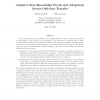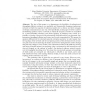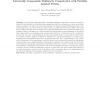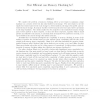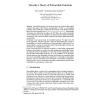37 search results - page 5 / 8 » tcc 2009 |
TCC
2009
Springer
14 years 9 months ago
2009
Springer
In the setting of secure computation, a set of parties wish to securely compute some function of their inputs, in the presence of an adversary. The adversary in question may be st...
TCC
2009
Springer
14 years 9 months ago
2009
Springer
: The aim of this paper is to demonstrate the feasibility of authenticated throughput-ecient routing in an unreliable and dynamically changing synchronous network in which the majo...
TCC
2009
Springer
14 years 9 months ago
2009
Springer
It is well known that universally composable multiparty computation cannot, in general, be achieved in the standard model without setup assumptions when the adversary can corrupt a...
TCC
2009
Springer
14 years 9 months ago
2009
Springer
We consider the problem of memory checking, where a user wants to maintain a large database on a remote server but has only limited local storage. The user wants to use the small ...
TCC
2009
Springer
14 years 9 months ago
2009
Springer
Extractable functions are functions where any adversary that outputs a point in the range of the function is guaranteed to "know" a corresponding preimage. Here, knowledg...
